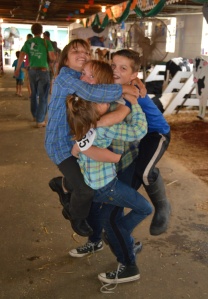The county fair rolls around only once each year, and it’s probably a good thing. It’s simply too much work for those involved to be expected to make it through even one week, let alone an encore performance six months later.
What is a county fair? An eight-day special event extravaganza where millions of small pieces and people come together in one brief venue, yielding various pay-off to various factions of those involved.

FAIR UNFAIRNESS – Sometimes the hard work exhibitors put into it seems to pay off. Other times, it feels like circumstances are ganging up on you.
The biggest events end up much shorter than all the preparation you put into getting ready for them; the hardest working person sometimes sees zero reward, while some slacker takes the prize; and the ride you stood in line forever to board ends up making you vomit the elephant ear you wasted your whole allowance on, and you walk funny for the rest of the day. Yes, learning abounds at the fair.
One of the best things about the county fair is that participation is a family event. Everyone living under one roof can take part and work together as a team. That said, one of the worst things about the county fair is that it is a family event. The pressure of trying to get it all done exposes your family team’s flaws and legacy issues.
Everywhere in life, there are haves and have-nots. The county fair is no exception. With regard to the “haves,” there are certain families that have winning legacies with certain types of animals or certain events within animal divisions. For instance, sometimes a family has an exceptionally well-trained “push button” horse that gets passed down through successive children. Heirloom unfair advantage.
Some families have the means to pay for professional training of their animals. Other families are able to travel and compete at livestock shows throughout the year, to the point when it comes time to enter the county fair show ring, they look bored instead of anxious. It’s so second-nature, they could very well carry a cup of coffee and check their cell phone messages while showing their animal.
I used to run into their adult, oratory counterparts in Toastmasters speaking competitions, so I can easily spot them. Some belonged to multiple Toastmasters clubs and speaking associations, and/or underwent private coaching and had jobs where they presented regularly. Was I envious? You betcha! Technically, they may not have been “professional” speakers, meaning they got paid specifically for speaking, but they were professionally prepared.
No matter how hard you try when up against the professionally prepared, the best the authentically amateur can hope for is a distant second place. While we like throwing around the maxim, “Hard work pays off,” sadly, there’s no guarantee. In addition to that disappointing reality, there’s an ironic, greater battle that gets waged among the “have-nots.”
Within the amateur ranks, there are always those who work their working-class tails off to become the best they can be within their financial and status limitations. While they can begrudgingly accept losing to the much more polished “haves” (due to years of practice), they emerge shell-shocked when they get knocked down a few notches by other “have-nots” whose stars have briefly aligned.
There is nothing more frustrating than losing in competition to someone whom the universe has sent an undeserved, lucky 4-H clover reward disproportionate to the hard work he/she did NOT put into his/her animal project. I know, because I have been both the spoiler and the spoilee in the unfairness sweepstakes. Worst case scenario is when the spoiler is a sibling! That’s the ultimate stinks-to-be-you experience.
As one county fair father said of his children’s arguing over the unfairness of the other siblings not working hard enough during their jointly-scheduled animal barn duty, “Welcome to real life, where you will encounter endless unfair. Get over it. Get used to it.”
Life lessons served fresh daily at the county fair.

